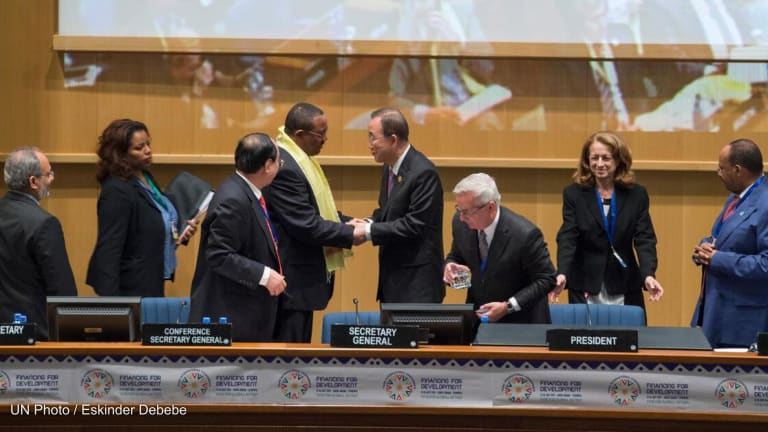By failing to live up to their obligations, developed countries are 'doing harm'
In a conversation with Devex in Addis Ababa, Ethiopia, Nobel Prize-winning economist Joseph Stiglitz had some harsh words for developed countries and explained how tax evasion is hurting development in poor countries.
Nobel Prize-winning economist Joseph Stiglitz had hoped to spur conversations — and action — around three things while in Addis Ababa, Ethiopia, during last week’s third International Conference on Financing for Development. The first was for all development stakeholders to have a “big change” in mindset. While development finance has evolved into more than official development assistance alone, he said, a broader perspective is still needed to find ways to unlock various sources of funding. The second was for developed countries to realize they have a “responsibility” that goes beyond delivering aid; they have to “do no harm.” Unfortunately, Stiglitz believes they are failing at that responsibility. “It’s not just that they’ve failed to live up to their moral obligation, their social obligations, their own commitments,” Stiglitz told Devex on the sidelines of a debate on international tax reform hosted by Friedrich Ebert Stiftung and the International Commission for the Reform of International Corporate Taxation. “They’re actually doing harm.” The third was for emerging markets to “exhibit some solidarity” with their poorer neighbors. The renowned economist is hoping these countries, particularly China, could fulfill their social responsibilities in a way that traditional developed nations have failed to do. Stiglitz sees the Asian Infrastructure Investment Bank as a move “in the right direction” and is optimistic more such new initiatives will bear fruit in these fast-growing economies. In a conversation with Devex, Stiglitz shared more of his insights into taxation’s role in global development and how tax evasion is hurting development in poor countries. Here are some highlights from that conversation: What is the key role taxation can play for global development beyond #FFD3 in concrete terms? I think the most important step forward is finally recognizing that developing countries have many sources of income potential — if they could only be realized and if the developed countries did the right thing. One of the things that they are doing to harm developing countries is the erosion of their tax base, and then criticizing them for not raising enough taxes. But of course the counterargument to cracking down on tax evasion in developing countries is that it will make them less business-friendly at exactly the time that more foreign investment is needed. How should the global development community start thinking about the balances and trade-offs between attracting investment and ensuring that this investment generates tangible local benefits? There are two or three aspects to the argument. First, tax competition is corrosive. Obviously, if you ask a business whether it would rather not pay taxes or pay taxes, unfortunately too many have been brought up in a view of completely selfish self-interest and would rather not pay taxes. ... They would rather free ride; they would rather other people paid for the costs of the infrastructure. But in the end, of course, it’s self-defeating because you’re not going to get adequate infrastructure, you’re not going to get adequately trained individuals without a tax base to support those. And that actually brings me to the second basic point: Good businesses realize that the basis of competition should be providing good services, and you pay for services. Many of our companies pride themselves and say, “Yes, we charge more for our product but you get what you pay for.” They understand that in the context of the products they sell, but why don’t they understand that in the context of the countries in which they operate? A very practical point of view, of course, and as a social justice argument for getting serious about tax evasion it seems fairly straightforward. But how do you propose to convince businesses that this is the right thing to do from an economic perspective? Well, more and more businesses have bought into the notion of shared value corporate responsibility, and as [ICRICT chair] José Antonio Ocampo said very forcefully, the most important corporate responsibility is paying your fair share of taxes. So there is a sense of recognition. The other aspect of this is that at least as many business leaders realize one of the real critical problems facing the world today is growing inequality. And they should not want to live in a world where these great divides make many places uninhabitable. Is there anything in the pipeline that gives you cause for optimism? The presence of civil society [in Addis] is a cause of optimism, the strong voice that we heard from [Oxfam International Executive Director] Winnie Byanyima. … The cause of pessimism is the narrow-minded view of the U.S. treasury under President Barack Obama, who you would have thought would have had more sympathy toward these issues. And "get" the social justice argument? And get both the social justice argument [and] the argument about why development is so important. Are there any areas of reform contained in the recent report by ICRICT, the commission on which you sit, that would really have an impact here to create a genuine, enabling environment for sustainable development? What could happen, but unlikely, given where they already are, is that there’s a momentum to recognize that our global tax system is broken [and] it needs to be fixed. If our report can get recognition of that, for them to say this is important enough from a global perspective for the U.N. to articulate a position and that voice will be heard. That would be the most optimistic thing, and it could happen. Recently you've advised Greece, which finds itself in the middle of a debt crisis. What can developed and developing countries alike learn from Greece's experience and what would be your key message to heavily indebted developing countries? I think what Greece highlights is the dangers of debt and therefore it highlights the importance of increasing domestic sources of finance, like better tax revenues, more revenues out of your natural resources, making sure that you don’t get overcharged on your health care products and pharmaceuticals. So it highlights the need for a debate around sovereign debt restructuring, and that framework debate is going on in the U.N., which again, unfortunately, on which the U.S. treasury is being recalcitrant and undermining — in fact, actually arguing against — an international rule of law. How can a government that says it believes in the rule of law argue against international rule of law? I find it unfathomable, unconscionable. But that is the U.S. treasury; it’s not the American people who feel this way. That’s why I always try to make that distinction. Missed major #Fin4Dev announcements and developments at the #FFD3 conference in Addis? Read the highlights from each day and reactions from civil society on all major developments in our running blog.
Nobel Prize-winning economist Joseph Stiglitz had hoped to spur conversations — and action — around three things while in Addis Ababa, Ethiopia, during last week’s third International Conference on Financing for Development.
The first was for all development stakeholders to have a “big change” in mindset. While development finance has evolved into more than official development assistance alone, he said, a broader perspective is still needed to find ways to unlock various sources of funding.
The second was for developed countries to realize they have a “responsibility” that goes beyond delivering aid; they have to “do no harm.” Unfortunately, Stiglitz believes they are failing at that responsibility.
This story is forDevex Promembers
Unlock this story now with a 15-day free trial of Devex Pro.
With a Devex Pro subscription you'll get access to deeper analysis and exclusive insights from our reporters and analysts.
Start my free trialRequest a group subscription Printing articles to share with others is a breach of our terms and conditions and copyright policy. Please use the sharing options on the left side of the article. Devex Pro members may share up to 10 articles per month using the Pro share tool ( ).
In his role as Editorial Director Richard oversees content for digital series, reports and events, leading a talented team of writers and editors, conducting high-level video interviews and moderating panels at events. Previously partnerships editor and an associate editor at Devex, Richard brings to bear 15 years of experience as an editor in institutional communications, public affairs and international development. Based in Barcelona, his development experience includes stints in the Dominican Republic, Argentina and Ecuador, as well as extensive work travel in Africa and Asia.




